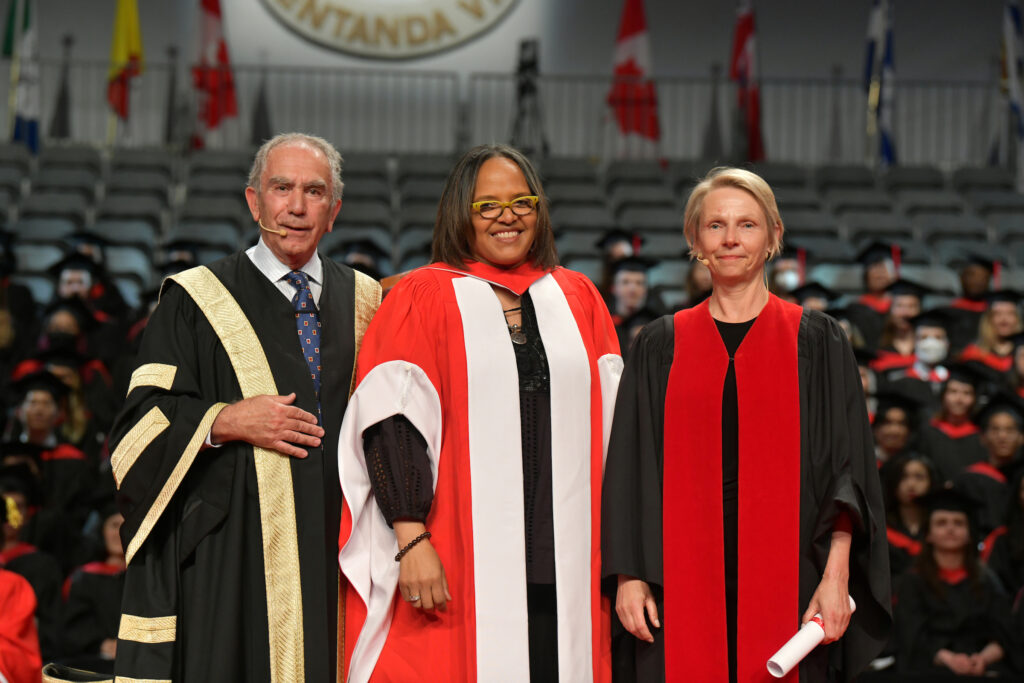By Alysia Burdi
On Tuesday, June 14, Terri Lyne Carrington, a professor and internationally respected drummer in jazz was awarded an honorary doctors of letters from York University at convocation.
An accomplished musician, Carrington has won three Grammy awards and was the first woman to win a Grammy for Best Jazz Instrumental Album. She is a graduate from the Berklee College of Music and now serves as artistic director and founder of the Berklee Institute of Jazz and Gender Justice. Carrington is both pioneering in jazz music performance and building the pathway for women performers in music.
Addressing graduates of the School of the Arts, Media, Performance & Design (AMPD), Carrington started off by thanking York University for the honour.
“I am so happy and sometimes still a little shocked that people value creative artists enough to honour a jazz musician in this way, and it gives me hope, actually, but it doesn’t come as a surprise, especially as what Sarah [AMDP Dean, Sarah Bay-Cheng] alluded to with your former chancellor being Oscar Peterson, which was amazing and also very important to me and as she mentioned it was responsible in a sense for me getting a scholarship at 11 years old to Berklee College of Music, so I am forever indebted to him because that changed my life,” she said.

Carrington reflected on her early life in a career that can be referenced as one that is “self-absorbed” or that praises accolades. She recalls having an empty feeling, a sense of uneasiness when receiving compliments and shying away from attention, forming a love-hate relationship with her work seeing that it was validation of her work but also made her question the nobility of her chosen path, comparing her work to those in medicine, education, social justice and more.
Carrington said she questioned her own worth, including being deserving of her pay and having fun while being awarded for it at the same time… that was until she said a “a light bulb turned on.” She expressed, “the marginality of men being paid more than myself and don’t question themselves at all, and second, I was not consciously actively trying to make a difference.
“I should have more women peers, and I should not be the exception; and if I am not part of the solution, then I am part of the problem, and this was a watershed moment for me,” she said. “Once I realized that a life of work contributing to the benefit of humanity to something bigger than my own personal joy to be purposeful with my actions, to have a mission attached to it was not only noble but actually necessary for me to truly be happy – once I realized all of this the stars aligned for me even more.”
Carrington noted this was the advice she wanted to leave with graduates as they embark of the professional world. Noting how lucky they all are to be part of community and university with values that are committed to social justice, global concerns, public good and more, Carrington expressed the most important way to move forward is with a purpose-driven, mission-oriented life.
“In fact, your generation is so much further ahead in these ways, and I applaud all of you. Make your life meaningful and noble,” she said.
Carrington explained to be noble is to be honest, to have integrity, be generous to others, show compassion and bravery, noting the most important trait to recognize is being selfless is a practice.
“It feels good when you are able to accomplish, it but it is not always easy,” she added.
Six years ago, Carrington met Berklee College of Music’s Women in Jazz Collective. In her address, she shared how she learned the stories of these women, stories that either brought tears to her eyes or filled her with anger. She said that she wanted to support these young women in particular. “Not only did I need to help with their education and intersectionality, power dynamics but educate myself and the more I understood, the more I shared what I knew with my peers both male and female,” she said.
“In jazz I wondered how it is possible that we all signed off that this is ok that men play the music and women sing it and this was basically an unwritten code that we all accepted it to be, which now seems to me to be totally crazy… the changes I see in this art form really encourages me because if jazz can make significant shifts in a short period of time, then it’s possible anywhere,” she said.
She recalls one of her mentors, jazz musician Wayne Shorter, once telling her that “music was just a drop in the ocean of life,” and it was a message that Carrington said helped her become focused, it informed her music and made it better.
“Be the person that affects environment than let environment affect you, write and play in order to see what would happen not because something works,” said Carrington.
She also encouraged graduates to find a mentor, noting beyond academia or the lecture walls, are also people who want to pass on their knowledge and wisdom.
Excited to see how society continues to evolve because of a new generation, Carrington recognizes at times she feels more like a student rather than a teacher. She applauded the graduating class by recognizing the role they play in advancing society.
“You have said times up in various ways, you said the lives of the marginalized matter, you demanded that the privileged put themselves in check, you’ve told politicians to go to hell, you’ve challenged your families and friends which is not an easy thing to do because it can mean losing something or someone dear to you, you all have limitless potential but it is wise to be mindful of your expectations as well to nurture your enthusiasm and most importantly your imagination,” she said.
Carrington said that in starting the Berklee Institute of Jazz and Gender Justice, the idea was to contribute to the collective work of setting new standards and shifting the narrative and transforming the culture of jazz without patriarchy. She notes, “this work has put me more in tuned with what I like to call the ‘rhythm of life’ much more than paying drums ever could. And when you’re in rhythm, you have instinct and wisdom you didn’t know you had.”
After a 40-year career, Carrington has found “there are no hard and heavy rules, being truthful, remaining open and finding the balance between extremes – the middle way – I find to be healthy.”
She told student the only right path, is the one they choose. It is not the one their parents or mentors choose for them. A purpose-driven life is rooted in the reason of being.
“When you find your flow, it will keep you up all night. If you’re lucky, it will give you strength when you thought you didn’t have it. It will feed you when there’s no food; it could even become your greatest love, something that will never let you down, and this is what I hope for all of you,” she said.


